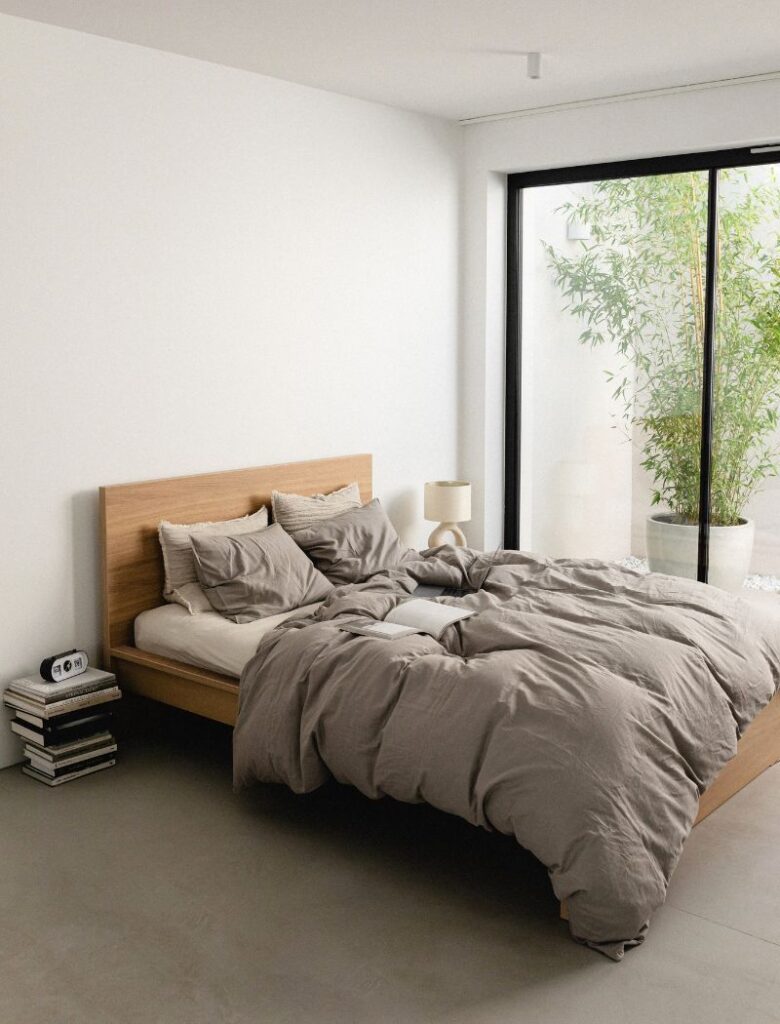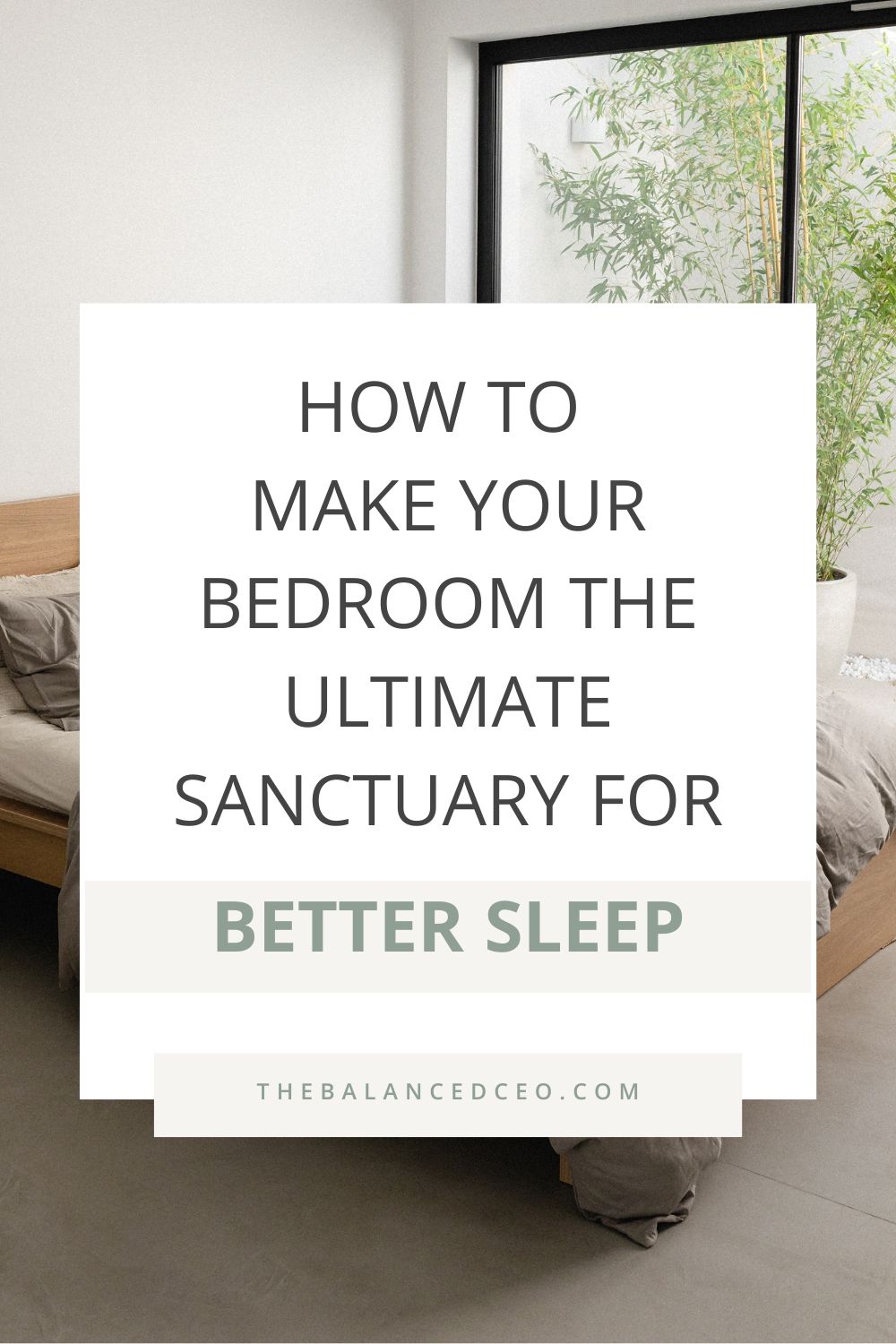This post may contain affiliate links, which means I’ll receive a commission if you purchase through my links, at no extra cost to you. Please read full disclosure for more information.

Some love it, others hate it, but you can’t get around it — everyone needs sleep. Whether you struggle sleeping or think you have the perfect bedtime routine, there’s always room for improvement. How you set up your bedroom and the moments leading up to resting your head can affect the quality of sleep you get.
If you want to start making a change toward better health, start with your sleeping habits. Here are a few things to consider when making your bedroom the ultimate oasis.
1. Decrease Blue Light Intake
What’s the last thing you do before falling asleep? If you’re like most people, you’re probably scrolling on social media or checking messages one more time before you close your eyes. In reality, you should put your phone down before entering the bedroom.
Blue light can decrease your body’s melatonin release, making it more difficult to fall asleep when you spend a lot of time on your devices. In the hours leading up to bedtime, replace your scrolling with something else, like playing a board game with the other members of your household or reading an intriguing book. If possible, keep your phone out of your bedroom so you won’t be tempted to use it.
2. Set a Cooler Temperature
You can’t rest well in a room that’s too warm. Over time, you’ll start tossing and turning, unable to sleep. When you fall asleep in a colder room, you may be more likely to sleep well. A room at a lower temperature is perfect for anyone in need of adequate rest. That way, you can still sleep with sheets and blankets without worrying about overheating.
If your room still feels too warm in the evenings, try including a table or box fan to blow some cooler air in your direction. Experiment with different temperatures to see which one helps you rest better. For example, while you may like the cool air a fan brings you, you might not like it blowing directly on your face.
3. Get Blackout Curtains
The right curtains can also help you get adequate rest. If you live in a city, you’re likely used to light flooding through your windows and occasionally disrupting your sleep. Blackout curtains can prevent that leakage and keep your room dark. Sometimes, they may also have muffling capabilities, allowing your bedroom to stay dark and quiet.
Push these curtains aside during the day to get as much natural light as possible. Letting yourself feel the sunlight — even indirectly — can benefit your circadian rhythm. The more natural light you get, the better you’ll sleep and feel throughout the day and even at night.
4. Opt for Soft Sheets
What better way to fall asleep than wrapped in soft and inviting sheets? If you have uncomfortable bedding, you’ll likely want to sleep anywhere but in your bed. It might lead you to sleep on the couch or in a chair — you won’t get adequate sleep that way. Softer sheets help you feel welcome in your bed so you can rest easier.
Reevaluating your mattress may also be a good idea. Is it the kind you like or would you be more comfortable sleeping on a different type of mattress? You can always purchase a mattress topper to give your bed a softer feel without upgrading your bed entirely.
5. Create a Bedtime Routine
Morning and evening routines are crucial to having productive days. When you do the same thing for days, your body will grow used to the routine, and you may even feel ready to rest by the time your head hits the pillow.
Practicing skincare is a great way to end your day, as you cleanse your face of the day’s grime while signaling you’re done with all your activities. Consider going to bed directly after you finish your skincare and brushing your teeth. It’s a great day-ending activity that doesn’t involve scrolling on your phone.
6. Get Better Pillows
You shouldn’t be piling several pillows on top of one another to get adequate support. Splurge on one that works well for your sleeping habits — you should search for one to go between your knees if you often sleep on your side.
You’ll start to notice a difference when you sleep on better pillows. You may experience less neck pain, but snoring could be one significant change. You may snore less or stop altogether with proper neck elevation, leading to better rest throughout the night.
7. Set a Bedtime
At first, you may not want to have a bedtime. Part of being an adult means making choices for yourself and many people want to stay up later to have some time to themselves. However, you’re only doing yourself a disservice by not getting seven or so hours of sleep per night.
When you sleep more than seven hours per night, you may see improvements in:
- Appetite
- Immune system
- Mental health
- Stress levels
With the right amount of sleep, you can do almost anything. You may notice you’re more productive in your waking hours, which can make up for not staying up as late to get things done. Overall, getting enough sleep by setting a bedtime is a great way to regulate your mood and keep you going all day.
8. Decorate Your Space Well
Your bedroom should be one of your favorite rooms in the house. It should put you at ease in every way, from the color of the walls to the art you hang up. Decorate your room as you see fit and you can rest better in your space.
9. Try Aromatherapy
If you have trouble relaxing before bed, you can rely on aromatherapy to lull you into a content or sleepy state. Many people know lavender can relax them just by smelling it, but it can also improve your sleep quality in its oil form. Whether you diffuse essential oils or rely on a lavender room spray, smelling it might help you rest easier at night.
10. Stay Out of the Bedroom Most of the Day
Don’t do your work in your bedroom. If you work from home, sit in your designated home office space, whether that’s another room or the dining room table. You should keep your bedroom off-limits most of the day so you don’t stay awake at night by being in an active space.
People who live in smaller spaces may not have the option to put their desks anywhere but in their bedrooms. In that case, categorize your space by separating your sleeping area from your office area. You might hang a curtain, or put your desk and bed on opposite sides of the room.
Sleep Better and You’ll Feel Better
Unfortunately, getting good sleep isn’t always as simple as closing your eyes and resting your head on a pillow. Sometimes, you have to work a little harder to ensure the quality of sleep you’re getting is worth your time. You’ll notice a difference in yourself when the quality of your sleep improves.

Cora Gold
Contributor
Cora Gold is the Editor-in-Chief of Revivalist magazine, a publication dedicated to happy, healthy, and mindful living.





Leave a Reply